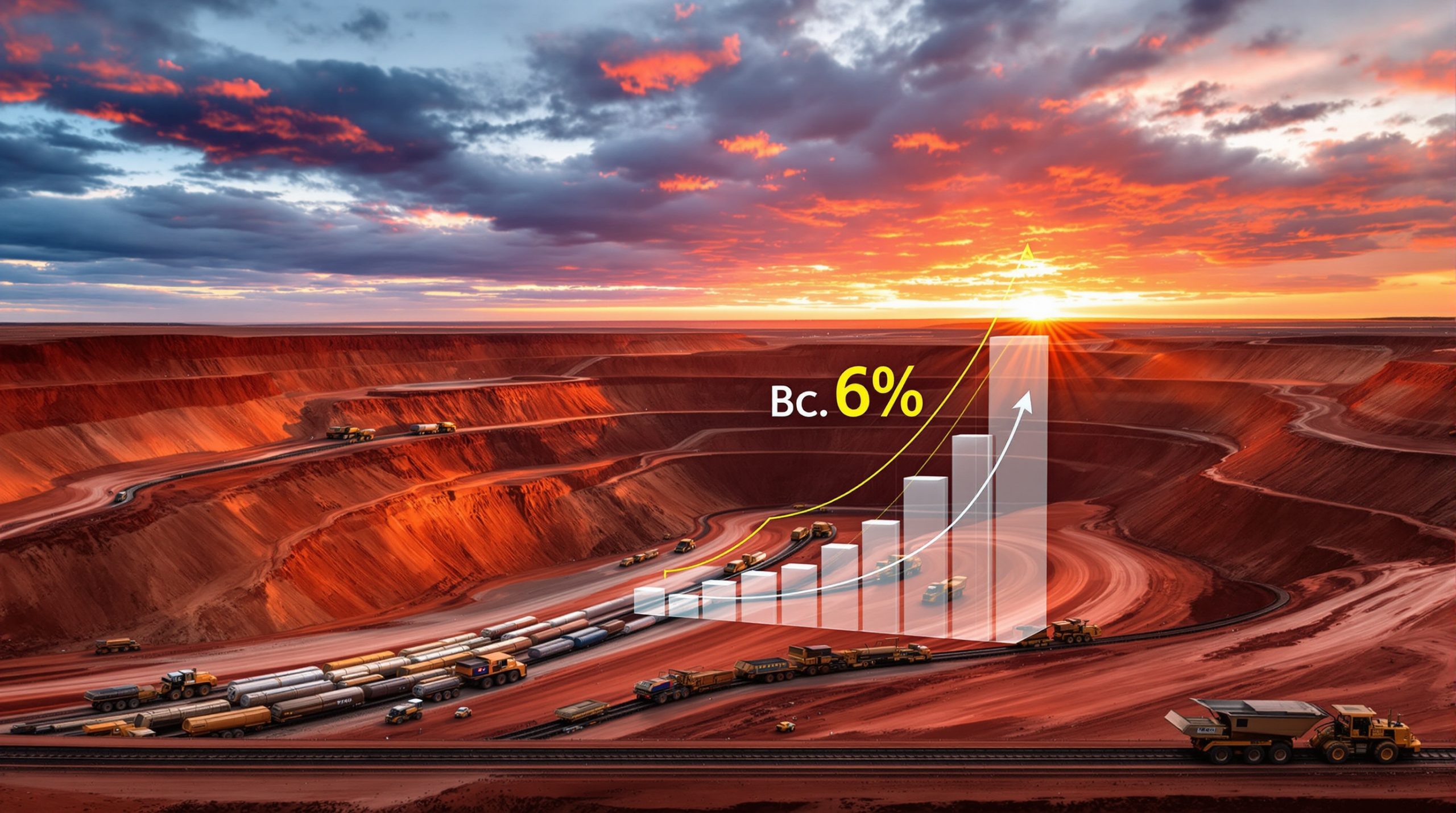Understanding Macquarie's Recent ASX All Ords Mining Stock Downgrades
Macquarie's recent downgrades of six ASX All Ordinaries mining stocks have caught investors' attention, highlighting potential shifts in the resources sector outlook. These rating changes reflect a combination of valuation concerns following strong share price performances and changing perspectives on commodity price impact.
What Triggered Macquarie's Reassessment?
The downgrades appear primarily driven by three factors:
- Exceptional year-to-date share price performance
- Revised production forecasts
- Concerns about future commodity price sustainability
The Six Downgraded Mining Stocks: Performance Analysis
29 Metals Ltd (ASX: 29M)
Rating Change: Outperform → Neutral
YTD Performance: 100% increase
Key Factors:
- Reduced production forecasts for CY25
- Zinc production guidance withdrawn following seismic impacts at Xantho Extended operation
- Valuation concerns after significant share price appreciation
Aeris Resources Ltd (ASX: AIS)
Rating Change: Outperform → Neutral
YTD Performance: 192% increase
Key Factors:
- Best performer in Macquarie's base metals coverage universe
- 79% target price increase despite downgrade
- Substantial outperformance compared to ASX 200's 8% YTD gain
Capricorn Metals Ltd (ASX: CMM)
Rating Change: Neutral → Underperform
YTD Performance: 117% increase
Key Factors:
- Valuation concerns after strong share price run
- New price target of $11 established
- Potential operational challenges ahead
Regis Resources Ltd (ASX: RRL)
Rating Change: Neutral → Underperform
YTD Performance: 135% increase
Key Factors:
- Valuation concerns following significant share price appreciation
- Price target set at $5.20
- Analyst divergence (other firms like JPMorgan have upgraded RRL)
Ramelius Resources Ltd (ASX: RMS)
Rating Change: Outperform → Neutral
YTD Performance: 85% increase
Key Factors:
- Strong share price performance
- Price target set at $3.70
- Potential for limited further upside
Perseus Mining Ltd (ASX: PRU)
Rating Change: Outperform → Neutral
YTD Performance: 86% increase
Key Factors:
- Valuation concerns after substantial share price gains
- Price target set at $4.70
- Potential moderation in growth trajectory
What's Behind These Mining Stock Downgrades?
Valuation Concerns After Exceptional Performance
The primary driver behind Macquarie's downgrades appears to be valuation-related concerns following extraordinary share price performance. With year-to-date gains ranging from 85% to 192%, these mining stocks have significantly outperformed the broader market, raising questions about sustainable growth prospects.
| Company | YTD Performance | Rating Change |
|---|---|---|
| Aeris Resources | 192% | Outperform → Neutral |
| Regis Resources | 135% | Neutral → Underperform |
| Capricorn Metals | 117% | Neutral → Underperform |
| 29 Metals | 100% | Outperform → Neutral |
| Perseus Mining | 86% | Outperform → Neutral |
| Ramelius Resources | 85% | Outperform → Neutral |
Operational Challenges and Production Forecast Revisions
Several of the downgraded companies face operational challenges that have prompted analysts to revise production forecasts. For example:
- 29 Metals: Withdrew zinc production guidance following seismic impacts at its Xantho Extended operation
- Production uncertainties: Across multiple operations, particularly in gold and base metals sectors
Commodity Price Outlook Considerations
While not explicitly mentioned for all companies, commodity price forecasts likely influenced these rating changes:
- Gold producers: Four of the six downgraded stocks (Capricorn, Regis, Ramelius, and Perseus) are gold producers
- Base metals concerns: Potential moderation in copper price outlook affecting 29 Metals and Aeris Resources
How Do These Downgrades Compare to Broader Market Trends?
Gold Sector Performance Context
The gold sector has been particularly strong in 2025, with the gold price recently breaking through US$4,000 per ounce. This backdrop makes the downgrades of gold producers especially notable, suggesting Macquarie believes much of the potential upside from gold price highs analysis is now priced in.
Analyst Divergence on Mining Outlook
Interestingly, not all analysts share Macquarie's cautious stance. For example:
- JPMorgan upgraded Regis Resources, citing strong cash flow prospects
- Citi downgraded Regis Resources due to rising costs and less optimistic production guidance
This divergence highlights the complexity of evaluating mining stocks in the current market environment, as noted in recent ASX market updates.
What Should Investors Consider When Evaluating These Mining Stocks?
Balance Sheet Strength and Cash Flow Generation
When evaluating mining stocks following analyst downgrades, investors should assess:
- Cash flow generation: Ability to generate strong cash flows at current commodity prices
- Balance sheet strength: Debt levels and financial flexibility
- Production costs: Position on the industry cost curve
Growth Projects and Expansion Plans
Despite downgrades, several of these companies have significant growth projects:
- Perseus Mining: Expanding its West African gold operations
- Capricorn Metals: Developing additional production capacity
- Aeris Resources: Copper expansion initiatives
Commodity Price Sensitivity
Understanding each company's sensitivity to commodity price movements remains crucial:
- Gold producers: Sensitivity to gold price forecast movements
- Base metals operators: Exposure to copper, zinc, and other industrial metals
Are These Downgrades a Warning Sign or Buying Opportunity?
Potential Warning Signals
The downgrades may signal:
- Valuation concerns: After substantial share price appreciation
- Production challenges: Particularly for companies with guidance revisions
- Commodity cycle positioning: Potential for commodity price moderation
Possible Buying Opportunities
However, these downgrades might also create opportunities for investors who:
- Have a longer-term investment horizon
- Believe in the structural demand for these commodities
- See operational challenges as temporary rather than structural
What's Next for ASX Mining Stocks?
Key Catalysts to Watch
Several factors could influence the trajectory of these mining stocks:
- Production updates: Quarterly production reports
- Commodity price movements: Particularly gold and copper prices
- Cost inflation trends: Impact on margins and profitability
- M&A activity: Potential for industry consolidation
Broader Economic Factors
The performance of these mining stocks will also be influenced by:
- Interest rate environment: Impact on financing costs and gold price
- Global economic growth: Demand for industrial metals
- Geopolitical tensions: Safe-haven demand for gold
Conclusion: Balancing Opportunity and Risk
Macquarie's downgrades of these six ASX All Ords mining stocks highlight the importance of balancing valuation considerations with operational performance and commodity price outlooks. While exceptional share price performance has prompted these rating changes, investors should conduct their own due diligence, considering both company-specific factors and broader market dynamics.
For investors interested in the resources sector, these downgrades serve as a reminder that even in strong commodity price environments, stock selection and timing remain crucial to investment strategies.
FAQs About Mining Stock Downgrades
What does a downgrade from "outperform" to "neutral" actually mean?
A downgrade from "outperform" to "neutral" indicates the analyst no longer expects the stock to outperform the broader market. It doesn't necessarily suggest selling the stock, but rather that its price may move in line with the market average.
How should investors interpret price targets following downgrades?
Price targets provide insight into an analyst's valuation perspective but should be considered alongside other factors. They represent a point-in-time assessment that can change with new information or market conditions.
Do analyst downgrades typically lead to immediate share price declines?
While downgrades can influence investor sentiment, their impact varies based on market conditions, trading volumes, and whether the downgrade was anticipated. Some stocks may experience short-term pressure but recover if underlying fundamentals remain strong.
What factors might lead to these mining stocks being upgraded again?
Potential catalysts for rating upgrades include better-than-expected production results, cost reductions, significant new discoveries, or stronger-than-anticipated commodity prices.
How do these mining stock downgrades relate to broader ASX market trends?
These downgrades come amid strong performance in the ASX resources sector, suggesting potential selectivity in future returns rather than sector-wide concerns.
Want to Stay Ahead of Major Mining Discoveries?
Discovery Alert's proprietary Discovery IQ model delivers instant notifications when significant ASX mineral discoveries are announced, helping investors capitalise on opportunities before the broader market. Explore how historic discoveries have generated substantial returns by visiting the Discovery Alert discoveries page today.




